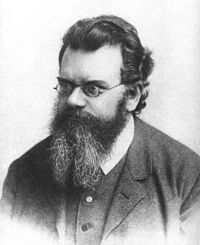
Back Konstante van Boltzmann Afrikaans ثابت بولتزمان Arabic Constante de Boltzmann AST Boltsman sabiti Azerbaijani Пастаянная Больцмана Byelorussian Константа на Болцман Bulgarian বোলট্জম্যান ধ্রুবক Bengali/Bangla Digemmenn Boltzmann Breton Boltzmannova konstanta BS Constant de Boltzmann Catalan
| Boltzmann constant | |
|---|---|
 Ludwig Boltzmann, the constant's namesake | |
| Symbol: | kB, k |
| Value in joules per kelvin: | 1.380649×10−23 J⋅K−1[1] |
The Boltzmann constant (kB or k) is the proportionality factor that relates the average relative thermal energy of particles in a gas with the thermodynamic temperature of the gas.[2] It occurs in the definitions of the kelvin (K) and the gas constant, and in Planck's law of black-body radiation and Boltzmann's entropy formula, and is used in calculating thermal noise in resistors. The Boltzmann constant has dimensions of energy divided by temperature, the same as entropy. It is named after the Austrian scientist Ludwig Boltzmann.
As part of the 2019 redefinition of SI base units, the Boltzmann constant is one of the seven "defining constants" that have been given exact definitions. They are used in various combinations to define the seven SI base units. The Boltzmann constant is defined to be exactly 1.380649×10−23 joules per kelvin.[1]
- ^ a b Cite error: The named reference
SI2019was invoked but never defined (see the help page). - ^ Richard Feynman (1970). The Feynman Lectures on Physics Vol I. Addison Wesley Longman. ISBN 978-0-201-02115-8.
© MMXXIII Rich X Search. We shall prevail. All rights reserved. Rich X Search